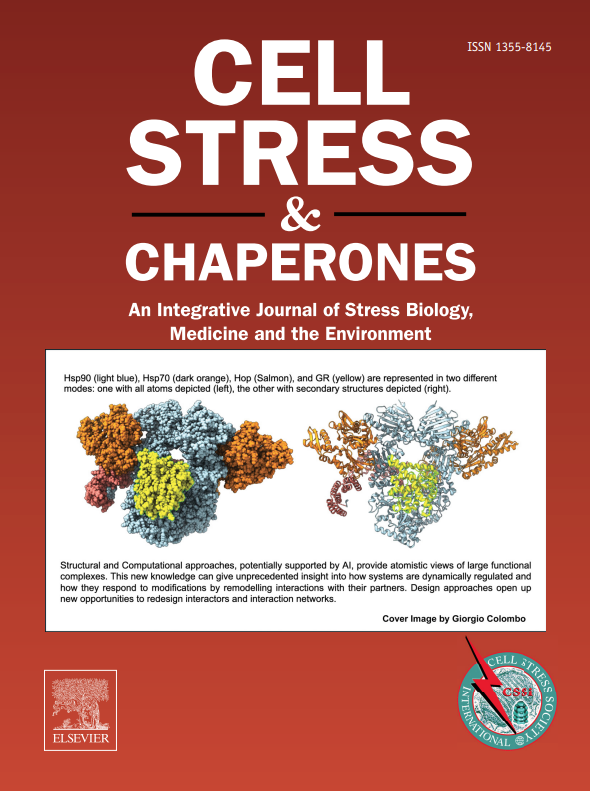Flow cytometry FRET reveals post-translational modifications drive Protein Phosphatase-5 conformational changes in mammalian cells
IF 3.2
3区 生物学
Q3 CELL BIOLOGY
引用次数: 0
Abstract
The serine/threonine Protein Phosphatase-5 (PP5) plays an essential role in regulating hormone and stress-induced signaling networks as well as extrinsic apoptotic pathways in cells. Unlike other Protein Phosphatases, PP5 possesses both regulatory and catalytic domains, and its function is further modulated through post-translational modifications (PTMs). PP5 contains a tetratricopeptide repeat (TPR) domain, which usually inhibits its phosphatase activity by blocking the active site (closed conformation). Certain activators bind to the PP5–TPR domain, alleviating this inhibition and allowing the catalytic domain to adopt an active (open) conformation. While this mechanism has been proposed based on structural and biophysical studies, PP5 conformational changes and activity have yet to be observed in cells. Here, we designed and developed a flow cytometry-based fluorescence resonance energy transfer (FC-FRET) method, enabling real-time observation of PP5 autoinhibition and activation within live mammalian cells. By quantifying FRET efficiency using sensitized emission, we established a standardized and adaptable data acquisition workflow. Our findings revealed that, in a cellular context, PP5 exists in multiple conformational states, none of which alone fully predicts its activity. Additionally, we have demonstrated that PTMs such as phosphorylation and SUMOylation impact PP5 conformational changes, representing a significant advancement in our understanding of its regulatory mechanisms.
流式细胞仪 FRET 揭示翻译后修饰驱动蛋白磷酸酶-5 在哺乳动物细胞中的构象变化
丝氨酸/苏氨酸蛋白磷酸酶 5(PP5)在调节激素和应激诱导的信号网络以及细胞外凋亡途径中发挥着重要作用。与其他蛋白磷酸酶不同,PP5 同时具有调节域和催化域,其功能还可通过翻译后修饰(PTM)进一步调节。PP5 含有一个四重肽重复(TPR)结构域,通常通过阻断活性位点(封闭构象)来抑制其磷酸酶活性。某些激活剂会与 PP5-TPR 结构域结合,从而缓解这种抑制作用,使催化结构域形成活性(开放)构象。虽然这一机制是根据结构和生物物理研究提出的,但 PP5 的构象变化和活性尚未在细胞中观察到。在这里,我们设计并开发了一种基于流式细胞仪的荧光共振能量转移(FC-FRET)方法,可以实时观察哺乳动物活细胞中 PP5 的自动抑制和激活。通过使用敏化发射对 FRET 效率进行量化,我们建立了一套标准化的、适应性强的数据采集工作流程。我们的研究结果表明,在细胞环境中,PP5 存在多种构象状态,其中任何一种状态都不能完全预测其活性。此外,我们还证明了磷酸化和 SUMOylation 等 PTM 对 PP5 构象变化的影响,这表明我们对 PP5 调控机制的理解有了重大进展。
本文章由计算机程序翻译,如有差异,请以英文原文为准。
求助全文
约1分钟内获得全文
求助全文
来源期刊

Cell Stress & Chaperones
生物-细胞生物学
CiteScore
7.60
自引率
2.60%
发文量
59
审稿时长
6-12 weeks
期刊介绍:
Cell Stress and Chaperones is an integrative journal that bridges the gap between laboratory model systems and natural populations. The journal captures the eclectic spirit of the cellular stress response field in a single, concentrated source of current information. Major emphasis is placed on the effects of climate change on individual species in the natural environment and their capacity to adapt. This emphasis expands our focus on stress biology and medicine by linking climate change effects to research on cellular stress responses of animals, micro-organisms and plants.
 求助内容:
求助内容: 应助结果提醒方式:
应助结果提醒方式:


